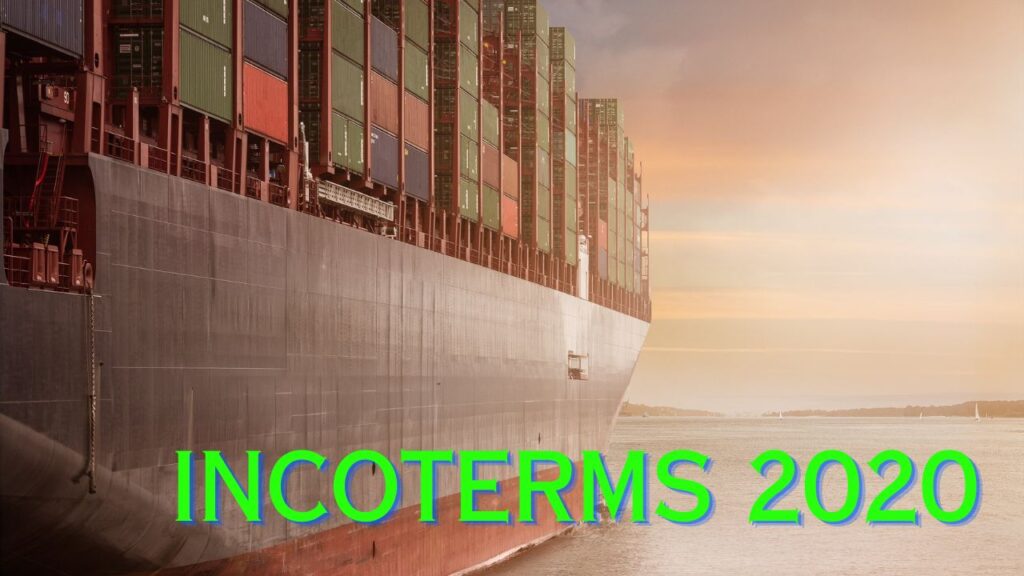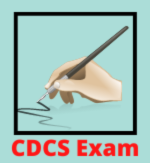In this post we’ll discuss Incoterms 2020 for CDCS exam in simple words. Incoterms 2020 is published by International Chamber of Commerce (ICC).

Table of Contents
What are Incoterms?
Incoterms stands for International Commercial Terms. These are a set of standard rules which defines the rights and responsibilities of importer and exporter in a trade transaction. The latest version of Incoterms is Incoterms 2020 which came into effect from 1st January 2020.
History of Incoterms
The Incoterms was first published in 1936.
Incoterms 2010 came into effect on 1 Jan 2011 (ICC publication no. 715)
Incoterms 2020 came into effect on 1 Jan 2020 (ICC publication no. 723E)
Incoterms 2020
There are 11 Incoterms in Incoterms 2020. The 11 Incoterms are divided into two groups. The first group having 7 incoterms can be used for any mode of transport (sea, air, road, rail etc). The second group having 4 incoterms can only be used for shipments by sea or inland waterway transport.
We’ll discuss all of the incoterms below in bullet points so that it is easy to remember. The most important points that concern us are:
- When is delivery of goods said to occur?
- Who pays for carriage? (This is also called freight/transportation)
- Who arranges insurance?
- Whose responsibility is Export customs clearance?
- Whose responsibility is Import customs clearance?
Please note that
Importer = Buyer
Exporter = Seller
We’ll use the words buyer and seller in the below discussion.
Group 1: Rules for any mode of transport (Incoterms 2020)
EXW (Ex Works)
- Delivery occurs when the seller places goods at buyers disposal at a named place.
- Carriage is paid by buyer.
- There is no obligation on either the buyer or the seller to procure insurance.
- Export customs clearance is done by buyer.
- Import customs clearance is done by buyer.
FCA (Free Carrier)
- Delivery occurs when the seller places goods at buyers disposal at a named place.
- Carriage is paid by buyer
- There is no obligation on either the buyer or the seller to procure insurance.
- Export customs clearance is done by seller.
- Import customs clearance is done by buyer.
CPT (Carriage Paid To)
- Delivery occurs when the seller hands over goods to the carrier.
- Carriage is paid by seller
- There is no obligation on either the buyer or the seller to procure insurance.
- Export customs clearance is done by seller.
- Import customs clearance is done by buyer.
CIP (Carriage and Insurance Paid To)
- Delivery occurs when the seller hands over goods to the carrier.
- Carriage is paid by seller
- Insurance is the responsibility of the seller.
- Export customs clearance is done by seller.
- Import customs clearance is done by buyer.
DAP (Delivered at Place)
- Delivery occurs when the seller places goods at the buyer’s disposal at the named place of destination on arriving means of transport. However the goods are not unloaded.
- Carriage is paid by seller
- There is no obligation on either the buyer or the seller to procure insurance.
- Export customs clearance is done by seller.
- Import customs clearance is done by buyer.
DPU (Delivered at Place Unloaded)
- Delivery occurs when the seller places goods at the buyer’s disposal at the named place of destination, unloaded from arriving means of transport.
- Carriage is paid by seller
- There is no obligation on either the buyer or the seller to procure insurance.
- Export customs clearance is done by seller.
- Import customs clearance is done by buyer.
DDP (Delivery Duty Paid)
- Delivery occurs when the seller places goods at the buyer’s disposal at the named place, cleared for import, however not unloaded from arriving means of transport
- Carriage is paid by seller
- There is no obligation on either the buyer or the seller to procure insurance.
- Export customs clearance is done by seller.
- Import customs clearance is done by seller.
Group 2: Rules for sea or inland waterway transport only (Incoterms 2020)
FAS (Free Alongside Ship)
- Delivery occurs when the seller places the goods alongside the vessel at the port of shipment.
- Carriage is paid by buyer.
- There is no obligation on either the buyer or the seller to procure insurance.
- Export customs clearance is done by seller.
- Import customs clearance is done by buyer.
FOB (Free on Board)
- Delivery occurs when the seller places the goods onboard the vessel at the port of shipment.
- Carriage is paid by buyer.
- There is no obligation on either the buyer or the seller to procure insurance.
- Export customs clearance is done by seller.
- Import customs clearance is done by buyer.
CFR (Cost and Freight)
- Delivery occurs when the seller places the goods onboard the vessel at the port of shipment.
- Carriage is paid by seller.
- There is no obligation on either the buyer or the seller to procure insurance.
- Export customs clearance is done by seller.
- Import customs clearance is done by buyer.
CIF (Cost, Insurance and Freight)
- Delivery occurs when the seller places the goods onboard the vessel at the port of shipment.
- Carriage is paid by seller.
- Insurance is the responsibility of the seller.
- Export customs clearance is done by seller.
- Import customs clearance is done by buyer.
Incoterms 2020 – some important points
- In incoterms EXW, both export and import customs clearance is done by the buyer. From the seller’s point of view, incoterms EXW is the lowest risk option.
- In incoterms DDP, both export and import customs clearance is done by the seller. From the buyer’s point of view, incoterms DDP is the lowest risk option.
- DPU is the only incoterms where the seller is required to unload goods at the named place in order to complete the delivery of goods
Insurance obligation in Incoterms 2020
As per the incoterms rules, insurance is an obligation only in the incoterms CIP and CIF, where insurance is to be arranged by the seller. For all the other incoterms there is no obligation on either the buyer or the seller to arrange insurance. However the buyer or seller may not want to assume all the risk. So any required insurance in the case of the incoterms EXW, FCA, CPT, FAS, FOB and CFR is arranged by the buyer. Similarly any required insurance in the case of the incoterms DAP, DPU and DDP is arranged by the seller.
Let’s understand this in a little more detail.
In incoterms EXW, delivery is done as soon as the seller places the goods at the buyer’s disposal at the named place. From that point onward, all risk and responsibility lies with the buyer. Please note that in an international trade transaction, this named place will be in a foreign country. So even though there is no responsibility on anyone to procure insurance, in this case the buyer has to arrange insurance to safeguard its interest and to protect himself against any eventuality.
Place of delivery vs Place of destination (Incoterms 2020)
Every incoterms is followed by the name of a place/port.
e.g. FOB Shanghai, CIF Chennai etc.
Below is the complete list on how the incoterms are written.
EXW Place of delivery
FCA Place of delivery
CPT Place of destination
CIP Place of destination
DAP Place of destination
DPU Place of destination
DDP Place of destination
FAS Port of shipment
FOB Port of shipment
CFR Port of destination
CIF Port of destination
A few important points to note are as follows:
- In the case of group 1 incoterms, it is always a place and in the case of group 2 incoterms, it is always a port.
- Place of delivery and place of destination may be the same or may be different. e.g. in case of incoterms DAP, DPU and DDP, delivery occurs at the place of destination. So in these case place of delivery and place of destination are the same. On the other hand, in case of incoterms CPT and CIP, delivery occurs when goods are handed over to the carrier at the seller’s end. However this place is not the destination. So in these cases, place of delivery and place of destination are not the same.
- In all the incoterms starting with C, destination is a named place/port and not place of delivery. In other words place/port of delivery and place/port of destination are different. Let’s take an example from sea shipment. Let’s say shipment is being done from Shanghai, China to Chennai India and the incoterms is CIF. Since the structure of CIF is CIF (Port of destination), it will be written as CIF Chennai. Now in this case delivery will occur when the seller places the goods onboard the vessel at the port of shipment i.e. Shanghai. And the port of destination is Chennai, India. Thus the port of delivery and port of destination are different.
Suggested Readings
- How to clear CDCS Exam
- Back to Back Letter of Credit
- Transferable letter of credit
- What is a Letter of Credit?
- 30 CDCS sample questions with answers
- Disregard, Obligation and Without Delay in UCP 600
- Incoterms 2020 for CDCS exam
- The words Must, May and Should in UCP 600
- What is a Bill of Lading?
- eUCP 2.0 – Uniform Customs and Practice for Documentary Credits for Electronic Presentation Version 2.0
- URR 725 – Uniform Rules for Bank-to-Bank Reimbursements under Documentary Credits
- UCP 600 – Uniform Customs and Practice for Documentary Credits
- SWIFT message types relevant for CDCS Exam

please edit point no. 5 in EXW
Thank you for pointing it out. This is now corrected.
Under Insurance Obligation under Incoterms 2020 3rd line…in sentence starting with ” For all the other Incoterms….” the last word “Incoterms” needs to be replaced by “insurance.”
Please review and rectify.
Thank you!
Hi thanks Rajendra for pointing it out. It has now been rectified.